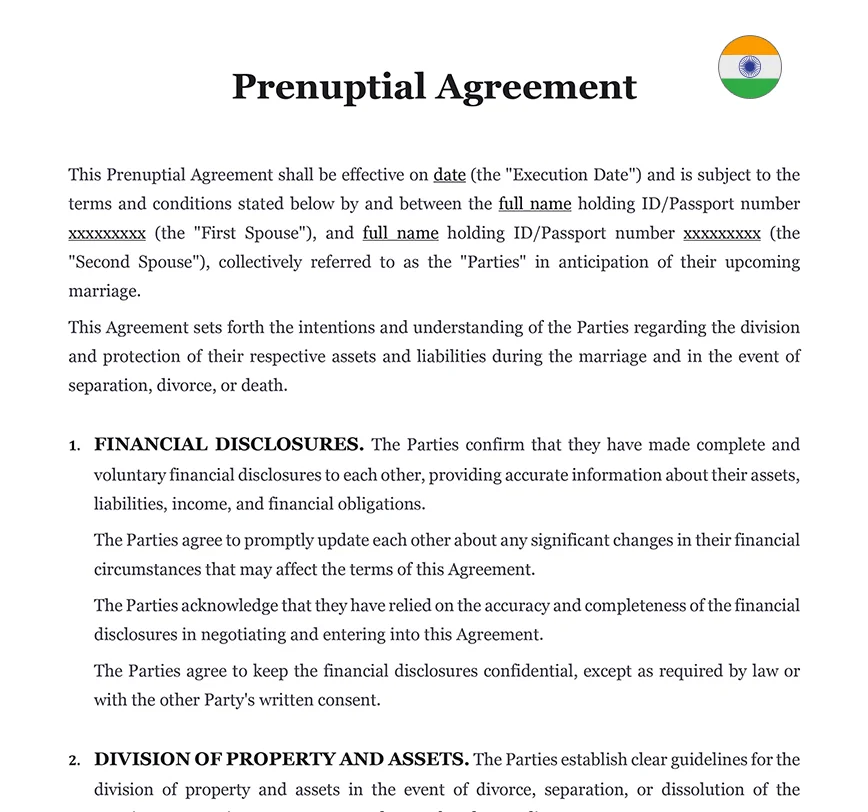
Download this prenuptial agreement to define how assets and liabilities will be divided between two people before they get married in the event of divorce or separation.

Word Document (.docx)

Ready to use legal template
Drafted by experienced lawyers
Compliant with Indian law
Ready to use legal template
Drafted by lawyers
Compliant with Indian law
A prenuptial agreement, often referred to as a prenup, is a legally binding contract entered into by a couple before they get married or enter into a civil partnership. It outlines the rights and obligations of each spouse/partner in the event of a divorce, separation, or death. Prenuptial agreements are designed to address various financial and property matters and provide clarity and protection for both parties involved. Here are some key aspects of a prenuptial agreement:
A Prenuptial Agreement, commonly referred to as a “prenup” or “premarital agreement,” is a legally binding contract designed for couples in India who are planning to get married or enter into a civil partnership. This agreement serves to define the financial and property rights of each party in the event of a divorce, separation, or the death of one spouse within the legal framework of India.
This ensures that the agreement complies with Indian laws and safeguards the individual interests of both parties. Prenuptial Agreements are valuable tools for any couple in India seeking to clarify and protect their financial interests before embarking on marriage.
In India, a Prenuptial Agreement is typically used by couples to outline the financial arrangements and rights of each party in the event of a divorce or separation. While Prenuptial Agreements are not as common in India as in some Western countries, their use has been increasing, especially among urban, educated couples. Here are some scenarios in which a Prenuptial Agreement might be considered in India:
Protection of Assets: Couples may use a Prenuptial Agreement to specify how their assets and finances will be divided in case of a divorce. This is particularly relevant if one or both parties have significant assets or if they want to protect certain assets acquired before the marriage.
Business Interests: If one or both spouses own businesses, a Prenuptial Agreement can address how business ownership, control, and valuation will be handled in the event of a divorce. This is crucial for protecting the interests of both parties and ensuring the smooth continuation of business operations.
Clarity on Financial Responsibilities: Couples may use a Prenuptial Agreement to define each spouse’s financial responsibilities during the marriage and in the event of a separation. This could include provisions for spousal support (alimony) and the handling of debts incurred during the marriage.
Preserving Family Wealth: In cases where one or both parties come from families with substantial wealth, a Prenuptial Agreement can be used to protect family assets and inheritance rights.
Non-Monetary Contributions: Couples may use a Prenuptial Agreement to acknowledge and define non-monetary contributions to the marriage, such as career sacrifices, homemaking, or support in raising children.
A comprehensive Prenuptial Agreement should address various aspects of the financial and legal relationship between spouses, providing clarity and protection in the event of a divorce or separation. While the specific provisions may vary based on individual circumstances and jurisdiction, here are key elements that are commonly included in a Prenuptial Agreement:
1. Full Disclosure: Both parties should provide a complete and accurate disclosure of their assets, debts, income, and financial obligations. This ensures transparency and fairness in the agreement.
2. Asset Division: Specify how the couple’s assets, properties, investments, and debts will be divided in the event of divorce, separation, or death. You can outline what assets will be considered separate property and what will be treated as marital property subject to division.
3. Spousal Support: Address the issue of spousal support or alimony payments, including whether they will be paid, the amount, and the duration. This can help avoid disputes and provide clarity on financial obligations in the event of a divorce or separation.
4. Inheritance and Estate Planning: Determine how each spouse’s assets will be distributed in the event of death, particularly if there are children from previous relationships or specific inheritance wishes. This may include provisions for trusts, beneficiaries, or other estate planning considerations.
5. Debt Allocation: Address how pre-existing debts and future debts incurred during the marriage will be allocated between the parties. This can help protect each spouse from assuming responsibility for the other’s debts.
6. Business Interests: If either spouse owns a business or professional practice, the prenuptial agreement can specify how the business or practice will be valued, divided, or maintained in the event of a divorce.
7. Personal Property: Specify how personal property, such as vehicles, jewelry, artwork, or other valuable possessions, will be divided in the event of a divorce or separation.
8. Dispute Resolution: Determine the process for resolving disputes that may arise during the interpretation or enforcement of the prenuptial agreement. This can include provisions for mediation, arbitration, or the choice of jurisdiction for legal proceedings.
9. Termination or Modification: Include provisions outlining the circumstances under which the prenuptial agreement can be terminated, modified, or invalidated, such as mutual agreement or changes in circumstances.
10. Execution and Legal Advice: Ensure that both parties have had the opportunity to review the agreement, seek independent legal advice, and sign the document voluntarily and without coercion.